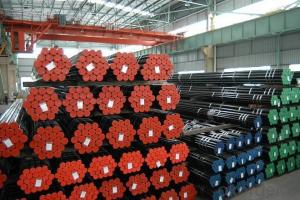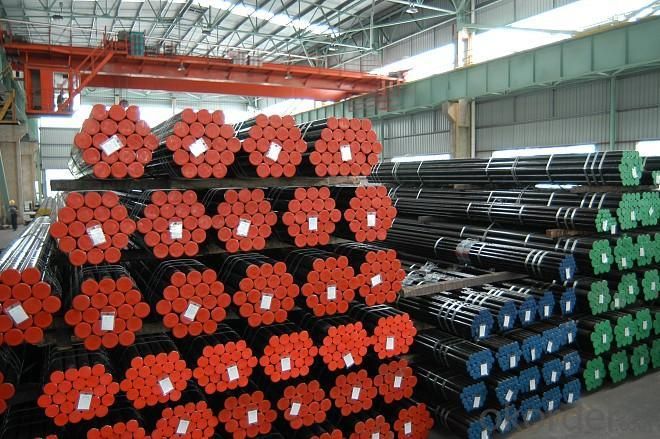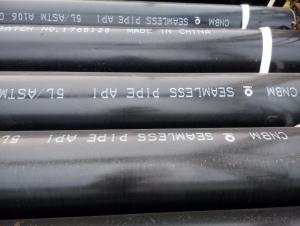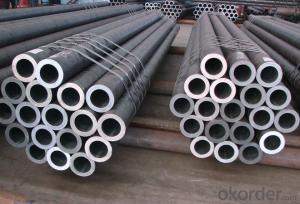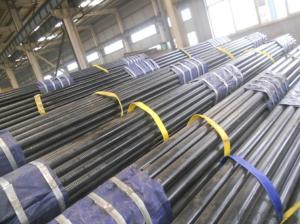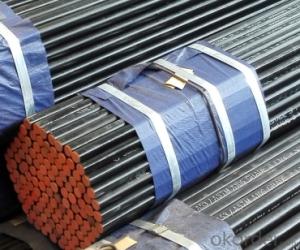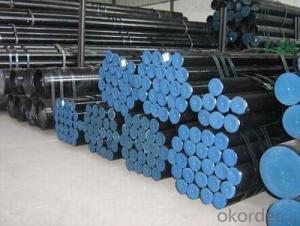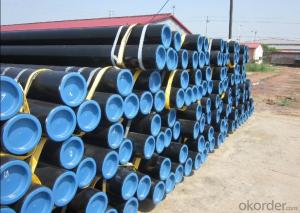Carbon Steel Seamless Steel Pipe API 5L ASTM A106
- Loading Port:
- Tianjin
- Payment Terms:
- TT OR LC
- Min Order Qty:
- 25 m.t.
- Supply Capability:
- 10000 m.t./month
OKorder Service Pledge
OKorder Financial Service
You Might Also Like
1、Structure of Carbon Steel Seamless Steel Pipe API 5L ASTM A106:
Seamless pipe is formed by drawing a solid billet over a piercing rod to create the hollow shell. As the manufacturing process does not include any welding, seamless pipes are perceived to be stronger and more reliable. Historically seamless pipe was regarded as withstanding pressure better than other types, and was often more easily available than welded pipe.
2、Main Features of the Carbon Steel Seamless Steel Pipe API 5L ASTM A106:
• High manufacturing accuracy
• High strength
• Small inertia resistance
• Strong heat dissipation ability
• Good visual effect
• Reasonable price
3、Carbon Steel Seamless Steel Pipe API 5L ASTM A106 Specification:
Standard | GB, DIN, ASTM ASTM A106-2006, ASTM A53-2007 |
Grade | 10#-45#, 16Mn 10#, 20#, 45#, 16Mn |
Thickness | 8 - 33 mm |
Section Shape | Round |
Outer Diameter | 133 - 219 mm |
Place of Origin | Shandong, China (Mainland) |
Secondary Or Not | Non-secondary |
Application | Hydraulic Pipe |
Technique | Cold Drawn |
Certification | API |
Surface Treatment | factory state or painted black |
Special Pipe | API Pipe |
Alloy Or Not | Non-alloy |
Length | 5-12M |
Outer Diameter | 21.3-610mm |
Grade | 20#, 45#, Q345, API J55, API K55, API L80, API N80, API P110, A53B |
Standard | ASME, ASTM |
1) Material:20#(ASTM A 106/A53 GRB.API5LGRB,GB),45#,16Mn,10#.
2) Specification range:OD:21.3-610mm,WT:6-70mm,length:6-12m or according to the requirement of clients.
3) Excutive standards:GB,ASME API5L.ASTM A 106/A53,Despite of the above standards,we can also supply seamless steel pipe with standard of DIN,JIS,and so on,and also develop new products according to the requirements of our clients!
4) Surface:black lacquered,varnish coating or galvanized.
5) Ends:Beveled or square cut,plastic capped,painted.
6) Packing:bundles wrapped with strong steel strip,seaworthy packing.
4、Packaging & Delivery
Packaging Details: | seaworthy package,bundles wrapped with strong steel strip |
Delivery Detail: | 15-30days after received 30%TT |
5、FAQ of Carbon Steel Seamless Steel Pipe API 5L ASTM A106:
①How is the quality of your products?
Our products are manufactured strictly according to national and internaional standard, and we take a test
on every pipe before delivered out. If you want see our quality certifications and all kinds of testing report, please just ask us for it.
Guaranteed: If products’ quality don’t accord to discription as we give or the promise before you place order, we promise 100% refund.
②How about price?
Yes, we are factory and be able to give you lowest price below market one, and we have a policy that “ for saving time and absolutely honest business attitude, we quote as lowest as possible for any customer, and discount can be given according to quantity”,if you like bargain and factory price is not low enough as you think, just don’t waste your time.Please trust the quotation we would give you, it is professional one.
③Why should you chose us?
Chose happens because of quality, then price, We can give you both.Additionally, we can also offer professional products inquiry, products knowledge train(for agents), smooth goods delivery, exellent customer solution proposals.Our service formula: good quality+good price+good service=customer’s trust
SGS test is available, customer inspection before shipping is welcome, third party inspection is no problem
- Q: What are the different methods of pressure testing steel pipes?
- There are several different methods of pressure testing steel pipes, including hydrostatic testing, pneumatic testing, and ultrasonic testing. Hydrostatic testing involves filling the pipe with water and pressurizing it to a specified level to check for leaks or weaknesses. Pneumatic testing is similar but uses compressed air or gas instead of water. Ultrasonic testing involves using high-frequency sound waves to detect any defects or flaws in the pipe. Each method has its own advantages and is chosen based on the specific requirements and industry standards.
- Q: Can steel pipes be used in extremely cold temperatures?
- Yes, steel pipes can be used in extremely cold temperatures. Steel is known for its strength and durability, making it suitable for various applications, including those in freezing conditions. However, it is important to note that steel contracts in cold temperatures, which may affect its dimensions and structural integrity. Therefore, proper insulation and precautions should be taken to prevent any potential issues such as cracking or leakage.
- Q: How do steel pipes handle soil movement?
- Steel pipes are highly resistant to soil movement due to their strength and durability. The rigid nature of steel pipes allows them to withstand ground shifting and settling without deforming or breaking. Additionally, steel pipes are often installed with proper anchoring and support systems to further enhance their ability to handle soil movement.
- Q: Can steel pipes be used for food processing facilities?
- Yes, steel pipes can be used for food processing facilities. Steel pipes are commonly used in the food industry due to their durability, resistance to corrosion, and ease of cleaning. They are also suitable for various processes such as conveying liquids, gases, and solids, making them a reliable choice for food processing facilities.
- Q: What are the different factors affecting the flow rate of steel pipes?
- There are several factors that can affect the flow rate of steel pipes, including the diameter and length of the pipe, the viscosity and temperature of the fluid being transported, the pressure difference across the pipe, and any obstructions or irregularities in the pipe's interior surface. Additionally, the type of fluid being transported and its flow characteristics, such as laminar or turbulent flow, can also impact the flow rate of steel pipes.
- Q: How are steel pipes protected against internal corrosion?
- Steel pipes are protected against internal corrosion through various methods, such as applying protective coatings or linings to the inner surface of the pipes. These coatings act as a barrier between the steel surface and the corrosive elements present in the transported fluids. Additionally, cathodic protection can be employed, where a sacrificial anode or an impressed current system is used to prevent corrosion by diverting the electrical current away from the steel surface. Regular maintenance and monitoring are also crucial to ensure the ongoing protection of steel pipes against internal corrosion.
- Q: How are steel pipes used in the food and beverage industry?
- Steel pipes are commonly used in the food and beverage industry for various purposes such as transporting liquids, gases, and solids, as well as for structural support. These pipes are highly durable, corrosion-resistant, and can withstand extreme temperatures, making them ideal for handling food and beverage materials safely and hygienically. They are used in applications like conveying water, oils, and gases, as well as in food processing equipment, brewing systems, and dairy processing plants. Additionally, steel pipes are also utilized for storage tanks, piping systems, and infrastructure in the food and beverage industry.
- Q: What is the cost of steel pipes?
- The cost of steel pipes can vary depending on various factors such as size, grade, quantity, and current market conditions. It is best to contact a supplier or check with local suppliers to get an accurate and up-to-date price quote.
- Q: How are steel pipes protected against electromagnetic interference?
- Steel pipes can be protected against electromagnetic interference by applying a layer of insulating material around the pipes or by utilizing electromagnetic shielding techniques such as wrapping the pipes with conductive materials. Additionally, grounding the pipes and implementing proper grounding practices can help minimize the impact of electromagnetic interference.
- Q: How are steel pipes used in automotive manufacturing?
- Automotive manufacturing extensively employs steel pipes for a multitude of purposes. The exhaust system represents one of the principal functions of steel pipes in this industry. In vehicles, the exhaust system is accountable for securely eliminating harmful gases generated during the combustion process. Steel pipes are employed in fabricating the exhaust manifold, which collects exhaust gases from the engine cylinders and directs them towards the exhaust pipe. Additionally, steel pipes are also utilized in constructing the chassis and frame of vehicles. The chassis offers structural support and aids in upholding the overall strength and stability of the vehicle. Due to their exceptional strength and durability, steel pipes are the optimal choice for manufacturing the chassis and frame. These pipes are frequently welded together to form a rigid and robust structure capable of withstanding diverse forces and impacts. Furthermore, steel pipes find application in the suspension system of automobiles. The suspension system is responsible for delivering a comfortable and smooth ride by absorbing shocks and vibrations. Steel pipes are employed in manufacturing suspension components such as control arms, tie rods, and sway bars. These components contribute to maintaining the stability, handling, and overall performance of the vehicle. Moreover, steel pipes are utilized in the fuel system of automobiles. They are responsible for transporting fuel from the fuel tank to the engine. These pipes necessitate resistance to corrosion and possess high tensile strength to guarantee the safe and efficient delivery of fuel. In conclusion, steel pipes play a pivotal role in automotive manufacturing. They are utilized in diverse applications including the exhaust system, chassis and frame construction, suspension system, and fuel system. The incorporation of steel pipes in these areas ensures the durability, strength, and performance of vehicles while simultaneously upholding safety and efficiency.
Send your message to us
Carbon Steel Seamless Steel Pipe API 5L ASTM A106
- Loading Port:
- Tianjin
- Payment Terms:
- TT OR LC
- Min Order Qty:
- 25 m.t.
- Supply Capability:
- 10000 m.t./month
OKorder Service Pledge
OKorder Financial Service
Similar products
Hot products
Hot Searches
Related keywords
